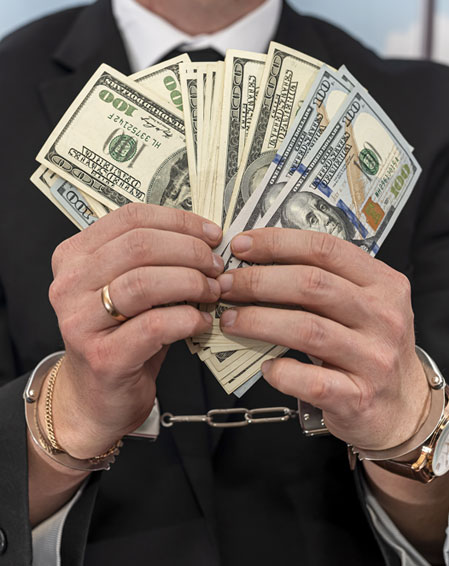Call For a Consultation (305) 373-4400
Federal Embezzlement Lawyer

Federal Embezzlement Attorney
Whether you unwittingly committed an embezzlement violation or were falsely accused, a federal embezzlement lawyer & law firm can provide you with the necessary resources and qualified assistance that is likely to earn you a favorable outcome. Speak with an embezzlement attorney promptly to learn more and get a case evaluation.
At the Law Offices of Barry M. Wax, a qualified criminal defense attorney is prepared to create a strong defense on your behalf and guide you along the entire process. Don’t wait to see how our adept legal team can defend you during a federal embezzlement case.
What Is an Embezzlement Offense in Florida?
The criminal act of embezzlement is a white-collar crime involving the theft of property or money by an employee from their place of work and/or employer. White-collar crimes, such as money laundering or most types of fraud, are usually non-violent in nature but involve large sums of money or extensive resources.
An unlawful violation must meet specific criteria to be charged with an embezzlement offense. The qualifications for embezzlement are:
- There must be a fiduciary interconnection between the embezzling perpetrator and the rightful owner of the stolen goods, like an employee and their employer. This element of a crime is what distinguishes embezzlement from instances of theft.
- The property holder passed control or authorized the monitoring of property/funds over to the criminal offender by intentionally, not accidentally, delegating it. This aspect establishes the intent behind the transfer of goods as one of purposeful trust, implying a duty; if the owner gave the property as a mistake, there is a lack of informed action, and the crime is not deemed embezzlement.
- The stolen property in Florida was exploited for the purpose of benefiting the perpetrator, even for a short time. This proves that there was fraud against the owner through disclosing false or misrepresentative information or deliberately omitting facts, for example.
- There was criminal intent behind the property theft. This is an important component as it protects those accused of embezzling who acquired the stolen goods by accident or unknowingly.
If these factors are proven to have occurred, the crime will be viewed, tried, and sentenced accordingly as embezzlement. However, if even one of these elements is not present in the crime or cannot be sufficiently proven, it will not be treated as embezzlement.
Criteria for Federal Embezzlement Crimes
Any unlawful act can potentially become a federal crime when the offense is so far-reaching that it falls under federal jurisdiction, violates federal laws, or involves federal agencies or employees. Federal crimes can encompass the defraudment of a federal entity, operations on an interstate/international scale, victimizes people across state borders, and terrorism-related offenses.
An embezzlement crime becomes federal when it includes theft from a federal agency or a simultaneous crime that is on a federal level. For example, acts of embezzlement that are within an operation present in several states would be considered federal crimes and tried in a federal court rather than one state court. A federal employee committing embezzlement against the U.S. government is another example.
The required criteria for federal embezzlement are no different from state qualifications except that the stolen property must be owned by or of interest to the United States government. A person can be successively persecuted by both the state and federal government for the same offense due to the Dual Sovereignty doctrine.
Laws and Penalties Regarding Federal Embezzlement
Any instance of theft that included seizing property from a federal agency or an agency that is funded by the federal government is a federal embezzlement offense. This only holds true if the crime was perpetrated by a federal employee, while they were employed by the federal government, making the offender a federal criminal.
The statute of limitations to charge an individual with this crime is five years. Appropriate punishment can involve sentences of up to 10 years in prison and/or fines that equate to the amount the stolen property is worth. Embezzling less than $1,000 worth of federal property may result in the offender facing an incarceration sentence of up to one year.
FAQs
Q: What Makes Something a Federal Crime?
A: An offense is a federal crime when it is so serious or wide-reaching that it violates federal laws. Federal crimes may be those that are conducted on federal property or assault federal employees, violate someone’s federal civil rights, defraud a federal agency, are conducted on an interstate or international level, victimize others across state lines, and offenses concerning terrorism.
Q: What Four Things Must Occur for There to Be a Case of Embezzlement?
A: There are four elements that must occur for a crime to be embezzlement. The first is that there is a relationship of a trusted monitorship between the offender and the property owner. Additionally, the owner must have allowed governance over or transferred property to the perpetrator because they entrusted them, not by mistake. Lastly, the property was stolen and used for the offender’s benefit, even briefly, proving the presence of fraud against the owner.
Q: What Makes Embezzlement a Federal Crime?
A: An embezzlement crime becomes federal when it includes theft from a federal agency or encompasses other violations on a federal scale. An example is an instance of embezzlement that utilized wire fraud, with internet offenses entering into federal jurisdiction. Another federal embezzlement violation could be a federal employee who embezzled money from the United States government.
Q: What Is the Federal Statute for Embezzlement?
A: The federal statutes for embezzlement are the same as state requirements, but the stolen property must be owned by or in the interest of the United States government; this includes federal agencies or federally funded agencies. The statute of limitation on these offenses is five years. Potential penalties include up to 10 years in prison and fines equal to the value of the stolen goods. If less than $1,000 worth of property was embezzled, the offender may only face a jail sentence.
Speak with a Federal Embezzlement Lawyer Ready to Represent You
Consult with a criminal defense lawyer at the Law Offices of Barry M. Wax who understands how to effectively represent you in cases of federal crime, including embezzlement. Our team is prepared to take a deep look into your case, build a strong defense strategy, and represent your rights.
Copyright © 2025 Barry M Wax PLLC. All rights reserved.












